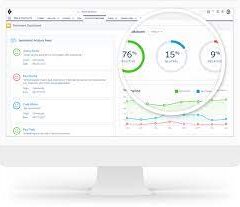As organizations embrace the growing presence of AI agents, leaders must address concerns about allowing autonomous systems to operate in sensitive environments. AI agents, often viewed as the future of how enterprises deploy large language models, raise important questions around security and identity management.
The rise of agentic AI has been notable in 2024, with Google launching its Vertex AI Agents, Salesforce introducing Agentforce, and AWS rolling out the re
Agent for Amazon Bedrock. These agents promise to deliver significant value by executing tasks using natural language commands, reasoning through the best solutions, and taking action without human intervention.
However, as Katie Norton, research manager for DevSecOps & Software Supply Chain Security at IDC, highlighted at Venafi’s Machine Identity Conference, AI agents present unique security challenges. Unlike robotic process automation (RPA), AI agents act autonomously, creating a need for secure machine identities, especially as they access sensitive data across multiple systems.
Matt McLarty, CTO at Boomi, added that the complexity of managing agentic AI revolves around ensuring proper authentication and authorization. He pointed out scenarios where agents dynamically interact with systems, such as opening support tickets, which require secure verification of agent access rights.
While these agents offer significant potential, businesses are not yet prepared to issue credentials for autonomous agents, according to McLarty. The current reliance on existing authentication and authorization systems needs to evolve to support these new AI capabilities. He also emphasized the importance of pairing agents with human oversight, ensuring that access and actions are traceable.
As AI advances into its third wave, characterized by autonomous agents capable of reasoning and action, companies need to rethink their approaches to workforce collaboration. These agents will handle low-value, time-consuming tasks, while human workers focus on strategic initiatives. In sales, for example, AI agents will manage customer interactions, schedule meetings, and resolve basic issues, allowing salespeople to build deeper relationships.
At Dreamforce 2024, Salesforce unveiled Agentforce, a platform that empowers organizations to build and deploy customized AI agents across service, sales, marketing, and commerce. This suite aims to increase efficiency, productivity, and customer satisfaction.
However, for AI agents to succeed, they must complement human skills and operate within established guardrails. Organizations need to implement audit trails to ensure accountability and develop training programs for employees to effectively collaborate with AI. Ultimately, the future of work will feature a hybrid workforce where humans and AI agents work together to drive innovation and success.
As companies move forward, they must ensure AI agents understand their limits and recognize when human intervention is necessary. This balance between AI-driven efficiency and human oversight will enable businesses to thrive in an ever-evolving landscape.
🔔🔔 Follow us on LinkedIn 🔔🔔










